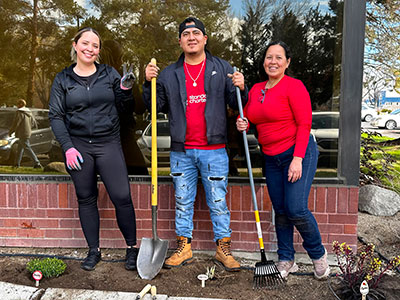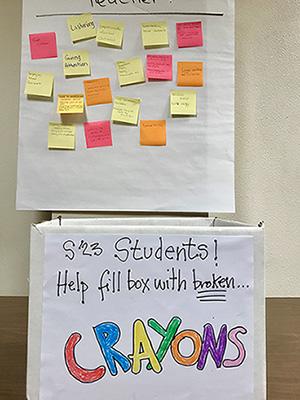
Our faculty, staff and administration have shown great passion for TMCC’s Year of Sustainability, which brought us rewarding growth through several events and projects that came to life throughout our campus: the Earth Day Celebration, ArtFest, Bee Campus USA Pollinator Garden Ceremony, and most recently, a Nevada Green Dining Certification, to name a few.
However, the small acts of sustainability that fly under the radar are equally important, shaping the bigger picture of what we’re striving towards as a community that cares deeply about our planet. Let’s take a moment to reflect on our expression of stewardship in all its bounty and strategize ways to maintain this energy in a world calling out for our help.
You Can’t Do Everything, But You Can Do Something
Chartering environmentally-friendly ventures with lasting sincerity comes in all shapes and sizes. When you cooperate and work towards a common goal, there's an unrivaled feeling of fulfillment when you finally accomplish it. Our genuine love for our college and planet reminds us to remain steadfast in our convictions, and it's a beautiful beginning. We're the authors of our story, and how the next chapter plays out resides with us.
Throughout this year, we've completed over 230 environmentally-conscious initiatives in the hopes of a greener future across campus, and it is invigorating to know that we don't just talk about it but be about it.
Juana Reynoza-Gomez, Program Director of Equity, Inclusion, and Sustainability, discussed how her office provided eco-friendly instruments for dining purposes combined with an optimistic message of sprucing up the campus.
“My office received a $500 sustainability grant from the TMCC Foundation. We used that money to purchase reusable cutlery made of wheat grass. We distributed them at the Earth Day event. Our goal is to encourage students, staff, and faculty to adopt reusable utensils and reduce the use of plastic on campus. I have plenty left over, too, and would love to get these cases into more hands,” said Gomez.
When we converse about methods to make a difference, that discourse can transform into reality within our classrooms and experiences at TMCC. No matter the scale of the undertaking, it’s our responsibility to support and learn from each other.
Together Everyone Achieves More
Even unconventional conversations matter, especially the ones with such shocking outcomes. Bringing sustainability ideas into our academic spaces was equally important as making physical changes this year. For example: Did you know that producing a pair of jeans requires roughly 2,000 gallons of water? That is enough to supply a person with eight cups of drinking water every day for ten years. It's theorized that the fashion industry could account for a quarter of the world's carbon footprint by 2050.
It was a topic brainstormed by students in Certified Nursing Assistant (CNA) instructor Doug Plourde's class. Deliberating solutions to redesign jeans in a far more sustainable and agreeable manner was at the forefront of their dialogue. Organic cotton, dry techniques, environmentally-safe dyes, recycling of denim, and ozone bleaching are all long-term resolutions to the problem facing us today.
Dr. Micaela Rubalcava, Education Professor, and Dr. Cecilia Vigil, Biology Professor, have been fighting the good fight for our planet’s survival, now and for future generations. As active members of the sustainability champions committee, they have witnessed a wide range of dedicated ecological activities in their colleagues’ curricula and everyday lives.
One such adventure led Rubalcava to guide the participation of Adult Basic Education (ABE) educators into more conservation endeavors, arranging workshops and encouraging instructors to apply for sustainability grants. Shortly after, ABE instructor Heather Haddox received a $350 grant.

ELL students ready to dig up soil for the plants.
In the spirit of TMCC’s Year of Sustainability, English Language Learner (ELL) students studied Seedfolks, a novel featuring a neighborhood of diversified individuals who cooperatively plant a community garden after a young girl sows the first seed. As a reflection of the fictional child’s pure intentions, the group of ELL students organized a real-world beautification plan for the TMCC Meadowood Center. Twenty-nine plants, including fertilizer and additional supplies, were purchased and planted to bring some blooms beside the emerald foliage and chestnut trunks of the trees.
The Future of Sustainability Efforts
“Vamos Verdes” is more than just a sweet catchphrase because it has become a lifestyle! As we set our hearts and minds on the prospects of a more promising tomorrow, we should continue to hold dear to the phenomenal work we’ve achieved and renew the values we share.

Box where broken crayons would go to be remade.
A fun, wholesome, and colorful upcycling art project involving broken crayons happened this year, reconstructing their dim hues into vibrant ones for educational purposes! TMCC education students had the chance to mingle with those of Glenn Duncan Elementary School, melting the smashed Crayola sticks into letter shapes to reinforce their literacy skills. It was a multicolored, environmentally-aware activity that taught the youth to be mindful of our planet's resources.
Rubalcava has already begun making future moves for the College, furthering our cultural-environmental appreciation and strengthening our ties with gracious northern Nevada inhabitants.
“I am working on acquiring an Indigenous land plaque for the Pollinator Garden. I want to collaborate with the Indigenous Student Advocate for a ceremony to stake it with Indigenous practices to enhance TMCC’s Pollinator Garden with cultural respect and intergenerational longevity activities,” said Rubalcava.
“I am scheduled for a STEAM (science, technology, engineering, arts, and math) September workshop with TMCC TRIO to create a culturally relevant butterfly mural with students. We will meet at the garden, do outdoor artwork while discussing curriculum, then work together on a collage painting about cultural-environmental belonging to hang in the TRIO office for the semester,” continued Rubalcava.
Faculty and staff are encouraged to apply for a sustainability grant during the 2023–2024 academic year, an opportunity to bring their visions to life through teamwork and imagination. There is no shortage of initiatives to be involved in, and it will feel rewarding when your department unifies behind its eco-friendly endeavors.
Pressing onward into a new school year is thrilling because there’s so much potential for prosperity! It reminds us that effective change is possible, and when we work in harmony, our purpose remains as clear as the radiant sun shining on this star we call home.
For more information, please visit the Year of Sustainability and Equity, Inclusion, and Sustainability websites.






